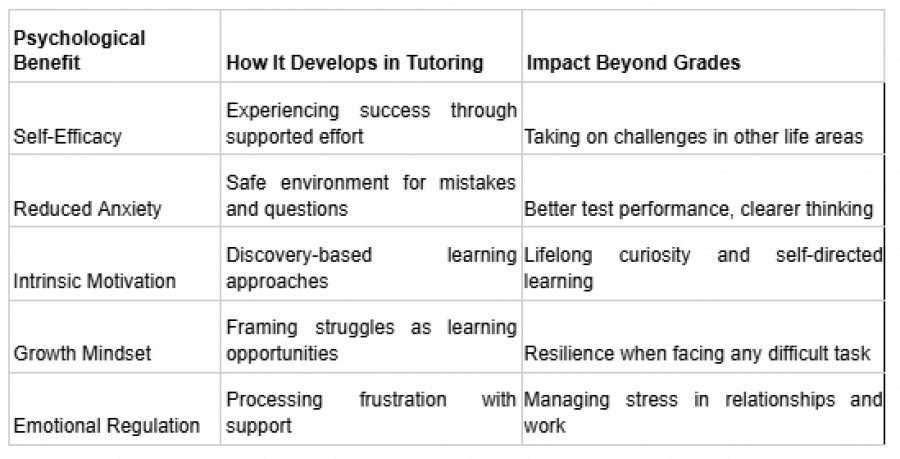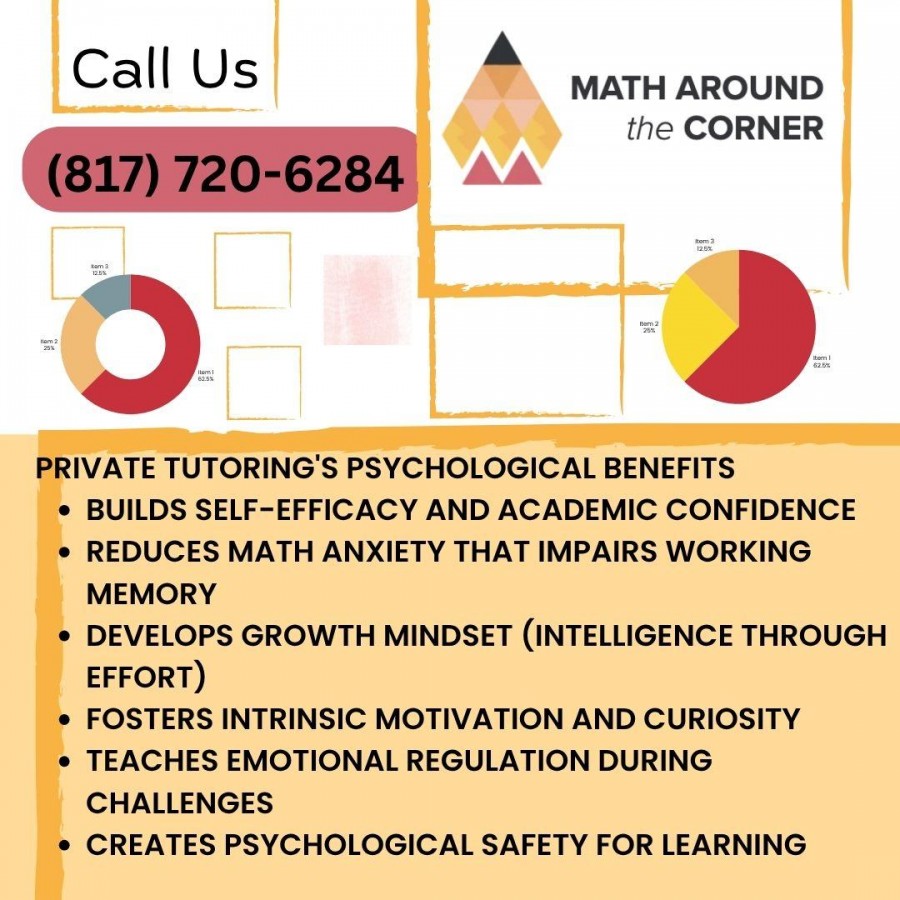The Psychology Behind Why Private Tutoring Benefits Go Beyond Grades

At Math Around the Corner, we’ve witnessed how private tutoring transforms more than grades. When a student's math average jumps from failing to an A, something more profound than academic improvement occurs. The transformation happens internally, in how that student sees themselves, approaches challenges, and believes in their capacity to learn. This psychological shift represents the hidden power of private tutoring that report cards never capture.
Parents across Fort Worth and the DFW metroplex invest in tutoring to improve grades, but the lasting private tutoring benefits extend far deeper. Understanding the psychological mechanisms behind effective tutoring helps explain why students who receive personalized support often excel not just in the tutored subject, but across their entire academic experience and into their adult lives.
Key Takeaways
Private tutoring rebuilds academic confidence by creating safe spaces where students ask questions without judgment, eliminating the social risks that silence learners in crowded classrooms and allowing knowledge gaps to close before they compound.
Research shows that math anxiety can reduce working memory considerably. Private tutoring benefits include dramatically lowered anxiety through personalized pacing and emotional support during challenging moments.
The "zone of proximal development" explains why students learn faster with private tutors who keep them in the sweet spot between too-easy and impossibly-hard material, maintaining engagement while building competence simultaneously.
Online private tutoring delivers the same psychological benefits as in-person sessions while removing transportation barriers and allowing students to learn in comfortable home environments that reduce stress for anxious learners.
The most powerful transformation involves changing internal narratives about learning ability. Effective tutoring methods systematically challenge beliefs like "I'm bad at math" and replace them with growth-oriented thinking that opens doors to previously avoided opportunities.

How Does Private Tutoring Improve Confidence?
Private tutoring rebuilds academic confidence by creating a safe space where struggle becomes productive rather than shameful. In classroom settings with 25-30 students, raising your hand to admit confusion feels risky. What if classmates think you're slow? What if the teacher seems frustrated? These fears silence students, leaving knowledge gaps that compound over time.
One-on-one tutoring eliminates this social risk. Students can ask "basic" questions without judgment. They can admit they've been confused for months, not just today. They can take the time they need to process information without feeling like they're holding others back.
According to industry research, students who received individualized tutoring showed significant increases in academic self-concept, with effects lasting beyond the tutoring period. This "self-concept" reflects how students perceive their own capabilities. When it improves, students attempt harder problems, persist longer when stuck, and view setbacks as temporary rather than permanent.
Carol Bearden, founder of Math Around the Corner, witnessed this transformation with her first tutoring student. A sixth-grader struggling in math didn't just improve her grades. She gained confidence that made her excited about learning. That internal shift matters as much as the external grade change.
Actionable Pointer for Parents:
Listen to how your child talks about themselves as learners. Phrases like "I'm just bad at math" or "I'll never understand science" signal damaged academic confidence. These beliefs often matter more than actual ability in determining outcomes. Quality tutoring doesn't just teach content; it rewrites these internal narratives.
What Psychological Benefits Does Tutoring Provide?
Private tutoring develops five core psychological benefits: self-efficacy, reduced anxiety, intrinsic motivation, growth mindset, and emotional regulation during academic challenges. Each of these represents a distinct mental shift that supports learning across all subjects and life situations.
Self-efficacy means believing you can succeed through effort. Students with high self-efficacy tackle difficult problems because they trust their ability to figure things out. Those with low self-efficacy avoid challenges because they expect to fail regardless of effort. Tutoring builds self-efficacy through carefully scaffolded successes that prove capability.
Reduced anxiety allows working memory to function properly. When students feel anxious, their brains dedicate resources to threat detection rather than learning. Research shows that math anxiety can reduce working memory capacity considerably, making problems harder regardless of actual math ability. Private tutoring reduces this anxiety by slowing the pace and providing emotional support during difficult moments.
Intrinsic motivation shifts why students learn. Instead of studying to avoid punishment or earn rewards, they begin finding satisfaction in understanding itself. Tutoring methods that emphasize curiosity and discovery over memorization and testing cultivate this internal drive.
Growth mindset reframes intelligence as developable rather than fixed. Students learn that "I can't do this yet" differs fundamentally from "I can't do this." The word "yet" implies that struggle represents a point on a journey, not a permanent destination.
Emotional regulation teaches students to manage frustration without giving up. When they encounter difficult problems with supportive guidance, they learn that discomfort precedes understanding. This skill transfers far beyond academics.

Math Around the Corner's 98% success rate reflects not just effective teaching, but the creation of psychological conditions where learning becomes possible. Students attending weekly sessions pass with As or Bs because they've developed the internal resources to persist through difficulty.
Actionable Pointer for Students:
Notice your self-talk when work gets hard. Do you think "This is impossible" or "I haven't figured this out yet"? That difference in phrasing changes your brain's response to challenge. Tutoring helps you build better internal dialogue.
Why Do Students Learn Better With Private Tutors?
The psychological principle of "zone of proximal development" explains why private tutoring accelerates learning beyond what students can achieve alone or in group settings. This concept, developed by psychologist Lev Vygotsky, describes the sweet spot between what learners can do independently and what remains beyond their reach even with help.
In classrooms, teachers must aim instruction at this zone for an entire group. Some students find the material too easy, others too difficult. Only a portion of the class occupies that productive learning zone at any given moment. Private tutoring keeps each student in their optimal zone throughout the entire session.
This individualized pacing matters psychologically as much as academically. When material feels too easy, students disengage and become bored. When it feels impossibly hard, they experience learned helplessness and stop trying. Staying in the zone of proximal development maintains engagement and builds competence simultaneously.
Online private tutoring offers these same benefits with added flexibility. Virtual sessions remove transportation barriers while maintaining the psychological safety of one-on-one interaction. Students in Fort Worth can work with tutors in Dallas or access support from home after extracurricular activities, making consistent progress more achievable.
Different tutoring methods emphasize different aspects of this psychological approach. Some focus heavily on building prerequisite skills before introducing new concepts. Others use the Socratic method, asking questions that guide students to discover answers themselves. Math Around the Corner's approach emphasizes matching tutors to students based on personality and learning style, recognizing that psychological fit matters as much as subject knowledge.
Actionable Pointer for Parents:
During initial tutoring sessions, watch whether your child seems comfortable asking questions and admitting confusion. The psychological safety of the relationship matters more than the tutor's credentials. A safe relationship enables learning; an uncomfortable one blocks it, regardless of teaching skill.
How Does One-on-One Attention Affect Learning?
Individualized attention activates the psychological mechanisms of accountability, personalized feedback, and relationship-based motivation that group settings cannot replicate. These factors work together to create conditions where students engage more deeply and retain information longer.
Accountability in tutoring differs from classroom accountability. Students can hide in the back of a classroom, copy homework from friends, or zone out during lectures. In one-on-one sessions, there's nowhere to hide, but this visibility feels supportive rather than threatening when the relationship is strong. Students prepare for sessions because someone they respect will notice their effort or lack thereof.
Personalized feedback addresses the specific thinking errors each student makes. Rather than generic corrections like "that's wrong," tutors can say "you're applying the right concept but to the wrong part of the problem" or "your logic works until this step, then let's look at what changes." This specificity helps students understand not just what's wrong, but why their thinking led them astray.
Relationship-based motivation leverages something deeply human. Students work harder for people they respect and who believe in them. When Carol Bearden receives texts from students excited to share test results, that emotional connection drives continued effort more powerfully than grades alone ever could.
The psychological literature on attachment theory helps explain this phenomenon. Students who feel securely attached to their tutor, meaning they trust the tutor will be supportive even when they struggle, take more academic risks. They attempt problems they're uncertain about, ask questions that reveal gaps in understanding, and persist through frustration because they trust the relationship can handle their imperfection.
How Psychological Safety Enables Learning:
Students admit confusion without shame
Mistakes become learning opportunities, not failures
Questions are encouraged and valued
The pace adjusts to understanding, not curriculum calendars
Emotions during learning are acknowledged and supported
Success is attributed to effort and strategy, not innate ability
These conditions rarely exist in traditional classrooms, not because teachers don't care, but because managing 30 students simultaneously makes individualized psychological support impossible. Private tutoring creates the conditions where these supportive dynamics become the foundation of every session.
How Does Tutoring Change a Student's Internal Dialogue About Learning?
The most powerful private tutoring benefits involve transforming the stories students tell themselves about who they are as learners. These internal narratives shape behavior more than external circumstances. A student who believes "I'm bad at math" will avoid math-related careers regardless of their actual ability. A student who believes "I can improve at anything with the right strategies" remains open to possibilities.
Effective tutoring methods systematically challenge limiting beliefs. When a student says, "I can't do this," a skilled tutor responds with, "You can't do this yet, but let's break it into pieces you can do." This reframing happens hundreds of times across months of sessions, gradually rewiring the student's default assumptions about their capability.
The transition from external to internal motivation represents another narrative shift. Students initially work to please parents or earn grades. Over time, they begin working because understanding feels satisfying, because solving a difficult problem creates pride, because they're curious about what comes next. This shift happens when tutoring emphasizes discovery and understanding over performance and compliance.
Math Around the Corner's boutique approach supports these psychological transformations through careful tutor-student matching and long-term relationships. Students work with the same tutor over time, allowing trust to deepen and the tutor to understand not just academic gaps, but the psychological patterns that created those gaps.
Actionable Pointer for Students:
Keep a "success journal" where you record problems you solved that seemed impossible at first. When you feel stuck on something new, review this journal. Your brain needs evidence that struggle leads to success, and you can provide that evidence to yourself.

What's the Connection Between Academic Safety and Risk-Taking?
Psychological safety in learning environments directly correlates with intellectual risk-taking, the willingness to attempt difficult problems, and to propose uncertain answers. This connection explains why students often learn more in tutoring sessions than in classrooms, even when covering the same material.
Risk-taking in academics means volunteering an answer you're unsure about, trying a problem-solving approach that might not work, or asking a question that reveals gaps in understanding. These behaviors feel risky because they expose potential incompetence to others. In psychologically safe environments, students take these risks freely because the social cost of being wrong is minimal.
Private tutoring, particularly the one-on-one model Math Around the Corner uses, maximizes psychological safety. Only two people witness any mistakes. The tutor's entire job involves supporting the student through confusion. There's no social comparison with peers, no worry about slowing down others, and no audience for failure.
This safety enables the "productive struggle" that learning science identifies as essential for deep understanding. Students need to work at the edge of their capability, encountering difficulty that requires effort to overcome. But they'll only accept this challenge when the environment feels safe enough to tolerate the discomfort.
Online private tutoring maintains these psychological benefits while adding convenience. Students can log in from their homes, wearing comfortable clothes, in familiar surroundings. For students who feel anxious in educational settings, this environmental control reduces barriers to engagement.
Building Psychological Safety at Home:
Celebrate effort over correct answers
Share your own learning struggles openly
Never use "natural talent" to explain success or failure
Ask "what did you try?" before "what's the answer?"
Make struggle a normal, expected part of learning
Avoid comparisons between siblings or peers
Let your child see you learning new, difficult things
When parents model these attitudes at home and tutors reinforce them in sessions using effective tutoring methods, students develop resilience that serves them throughout life.
Transform Your Child's Relationship With Learning
The grades your child earns today matter less than the psychological foundation they build for lifelong learning. When students develop confidence, reduce anxiety, build intrinsic motivation, adopt growth mindsets, and learn to regulate emotions during challenges, they gain tools that serve them in every future endeavor.
At Math Around the Corner, we’ve spent nearly two decades helping Fort Worth students transform not just their grades, but their beliefs about what they’re capable of achieving. Our personalized, one-on-one approach creates the psychological safety where deep learning becomes possible. With 98% of our students attending weekly sessions passing with As or Bs, we see firsthand the academic and psychological impact of this model.
If you’re ready to help your child build confidence alongside competence, call us at (817) 720-6284 or email hello@matharoundthecorner.com to discuss how our personalized tutoring can address both the academic and psychological barriers to their success. We proudly serve Fort Worth, Dallas, and nearby areas throughout the DFW metroplex, offering flexible in-home and virtual sessions that fit your family’s schedule.
